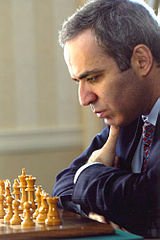The Perfect Move
Kasparov, one of the greatest player of all time
I had a chess program on my computer but I could beat it a good part of the time and I never imagined it would become a serious threat to the greats. There were more possibilities in the first 3 moves of a game of chess than atoms in the universe, I was told. Or something like that. And as there were millions more processes happening in the human brain that in the universe, it seemed like the perfect match.
I wonder if Kasparov once thought so, too.
In 1997, Kasparov lost a match against the IBM Deep Blue chess machine and though Kasparov alleged that IBM had cheated, it was clear that even if it had not already arrived, the day would eventually come when humans could no longer compete with machines.
I’d like to say that’s why I gave up chess. Really, of course it was because I wanted to expand my social horizons from the world of late evenings with badly-dressed old men slurping tea and making chess quips. I had also started smoking marijuana and though I gave it up after a couple of years, my sharpness on the board had been blurred for life.
But I also intuited, long before the invention of smart phones, that as big as the possibilities were, eventually a computer would be devised that would know beyond any doubt what was the best move to make in any situation. Just picture it: 2025, you’re sat across a chess board from some idiot who’s playing Angry Birds 5 on his Iphone 16, you’re sweating through the complications of a Queen’s pawn attack, while he just consults his Chess For Dummies app every few minutes.
And that – unless chess inexplicably starts attracting lots of nubile females in the 20’s to start playing – is why I’ll never go back to the game.

Hi! I am a robot. I just upvoted you! I found similar content that readers might be interested in:
http://www.tomthumb.org/695/the-story-of-the-man-who-could-win-a-game-of-chess-in-9-moves/
Downvoting a post can decrease pending rewards and make it less visible. Common reasons:
Submit